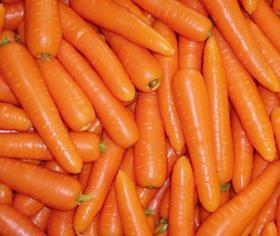
The British Carrot Growers Association is financing a new university study into the cancer-fighting properties of carrots.
Supported by HDC Funding, the three-year project run at the University of Newcastle will measure the effects of eating carrots, parsnips and celeriac on biomarkers for cancer and inflammatory diseases.
Bringing together food scientists, chemists and clinicians, the new study will focus on a group of compounds known as polyacetylenes - natural plant chemicals that protect the plant from attack and only occur in vegetables of the carrot family and a few other closely related species such as ginseng.
Previous lab-based work has suggested these compounds can have beneficial effects on cell culture models of inflammation and cancer. They were also found to reduce cancer growth in a rat model.
Now the team, led by PhD student Sarah Warner, is looking to take the research to the next stage, which will include recruiting more than 20 volunteers to take part in a dietary trial with six- to ten-week test periods.
Martin Evans, MD of the Chantenay carrot growing co-operative Freshgro, and who championed the research said: “It has long been accepted that carrots are very good for us, brimming with betacarotene and fibre and contributing to our 5 A DAY, but this research project will go much further in improving our knowledge and awareness of the health benefits of this group of root vegetables.”
Dr Kirsten Brandt, a senior lecturer at Newcastle University’s School of Agriculture, Food and Rural Development and the project supervisor, said: “After seeing the positive effects of feeding carrots in the animal experiments, it is important to test if it also works in humans, in particular to find out how much carrot we must eat to obtain a health benefit.
“To test this we will be investigating what effect eating these vegetables has on the levels of key indicator chemicals – known as biomarkers – in our blood.
“Biomarkers can be used to assess how well the body’s cells are functioning and thus indicate the risk that a person will develop a disease in the future. For example, cholesterol in the blood is a well-known biomarker for heart disease, while other biomarkers can tell us about the risk of cancer or inflammatory diseases such as arthritis.”
Dr Wendy Wrieden, based in the Human Nutrition Research Centre at Newcastle University, added: “Currently average consumption of vegetables and fruit is considerably below recommendations. We know that eating a variety of vegetables and fruit can reduce the risk of some cancers and other chronic diseases. Hopefully this work will give us a clearer picture of the role of vegetables and perhaps provide encouragement to the public to eat more.”
The university will first investigate how cooking affects bioavailability, that is, how much of the polyacetylenes are absorbed into the body when the vegetables are eaten, by preparing them in different ways - raw, boiled or fried, and in large or small pieces.
The water or oil in which the carrots, parsnips and celeriac have been cooked will also be tested to see if there are any health benefits in re-using it, such as in stews and soups.



